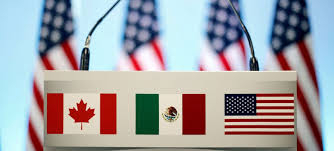Mexico becomes first country to ratify new North American trade deal
All the versions of this article: [English] [Español] [français]

Washington Post | June 19, 2019
Mexico becomes first country to ratify new North American trade deal
By Mary Beth Sheridan
MEXICO CITY — Mexico on Wednesday became the first country to ratify the new North American free-trade agreement, as its Senate voted overwhelmingly to approve the deal updating the rules for one of the world’s largest trade blocs.
Senators voted 114 to 4 to ratify the U.S.-Mexico-Canada Agreement, which needed only a simple majority to pass. Mexico’s Senate has sole responsibility for approving international treaties negotiated by the country’s president.
Mexico has been a strong proponent of the pact, which builds on NAFTA, the free-trade accord that has transformed this nation’s economy over the past 25 years. Mexico sends about 80 percent of its exports to the United States, and the two countries’ manufacturing processes have become increasingly intertwined.
Mexican President Andrés Manuel López Obrador said the treaty would be good for job creation, trade and foreign investment.
“We once again reiterate our determination, our conviction to maintain relations with Canada and the United States of friendship and cooperation in enhancing development,” the leftist leader said in a video statement.
While the new treaty sailed through the Mexican legislature, it faces a rougher road in the United States. House Speaker Nancy Pelosi (D-Calif.) hasn’t set a date for a ratification vote. Democrats, who hold a majority in the House, say they want stronger enforcement mechanisms for the pact’s labor and environmental rules.
If the pact isn’t ratified this year, it risks getting bogged down in the U.S. presidential campaign next year.
In Canada, meanwhile, Prime Minister Justin Trudeau wants to get the deal through Parliament, but the timing is tight. He is scheduled to meet with Trump at the White House on Thursday, and then with congressional leaders on Capitol Hill.
If the Trump administration can reach an agreement with the Democrats, the Canadians will probably press ahead on a vote this summer — even if it means calling members of Parliament back from their summer break.
In Mexico, there has been little opposition to the new agreement. Mexico’s congress passed a labor law in April that strengthens independent unions, addressing concerns raised by U.S. Democrats.
Mexico this year became the No. 1 trade partner of the United States. Census data released in April showed that Mexico’s trade with the United States rose to $97.4 billion for the first two months of 2019, lifting it above Canada, at $92.4 billion, and China, at $90.4 billion.
“Obviously, we are hoping [ratification] helps to reduce the constant uncertainty we’ve faced since President Trump entered the White House,” said Juan Carlos Baker, a former subsecretary of foreign trade who helped negotiate the pact.
Mexico has been buffeted by constant threats from the Trump administration to disrupt trade. After Trump took office in 2017, he suggested ripping up the existing North American Free Trade Agreement, saying it was unfair to American workers. He later agreed to renegotiate the pact, producing the current agreement.
More recently, Trump threatened to impose stiff tariffs on all Mexican imports if the country didn’t halt the growing number of Central Americans crossing its territory to reach the United States.
After days of negotiations in Washington, Mexico agreed to step up enforcement of irregular migration, deploying a militarized national guard to its border with Guatemala, arresting thousands more migrants per week and accepting busloads of asylum seekers turned away from the U.S. border daily.
But the clash left business leaders and politicians uneasy about the strength of their nation’s trade relationship with the United States.
In Mexico, passage of the new treaty — known here by its Spanish initials, T-MEC — was never in doubt. López Obrador’s party holds a majority in the Senate. Opposition parties declared in recent days they would back the new accord — although some senators did so reluctantly.
“It’s not the best treaty, but it’s the one we’ve got,” Antonio García Conejo, a senator from the leftist Revolutionary Democratic Party, said during the debate. He added: “We have to keep seeking alternatives and diversify our commerce.”
The new agreement is essentially an updated version of NAFTA. Among its changes are a requirement that more components for autos be produced in the three countries and a provision that about 40 percent of each vehicle be produced by workers who earn at least $16 an hour.





